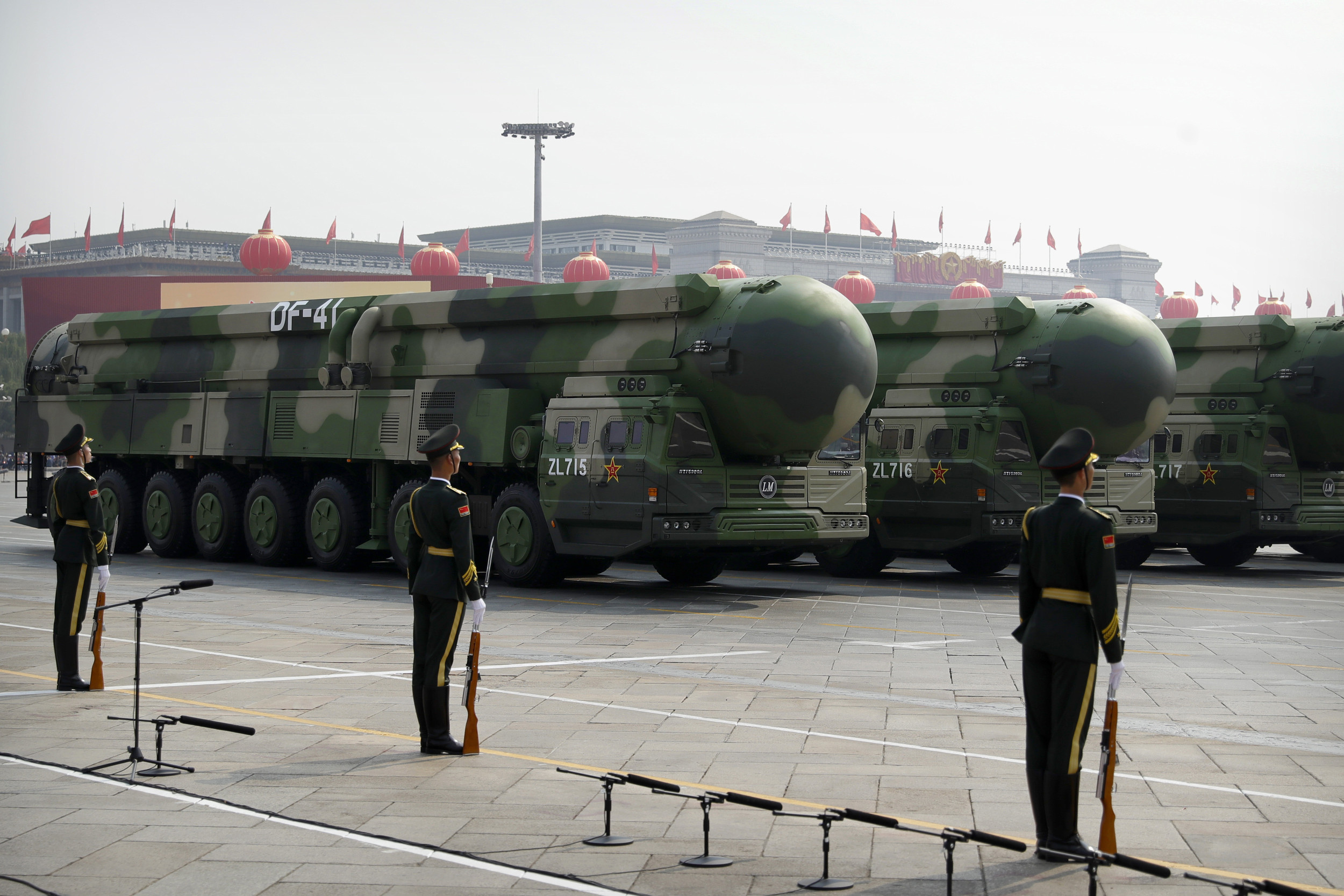China on Thursday urged nuclear-armed countries to make a commitment to no first-use of nukes and said that any attempt to smear or distort China’s nuclear policy would be “in vain.”
“Nuclear-weapons states should negotiate and conclude a treaty on ‘mutual no-first-use of nuclear weapons’ or issue a political statement in this regard, in order to prevent nuclear arms race and reduce strategic risks,” said Sun Xiaobo, director general of the Department of Arms Control under China‘s Foreign Ministry, according to a translation of his comments provided by the Permanent Mission of the People’s Republic of China to the United Nations.
He was speaking during the general debate of the 79th U.N. General Assembly First Committee in New York and following a rare, publicized test launch of a ballistic missile by China.
Sun called for the “complete prohibition and thorough destruction” of nuclear weapons, as well as the establishment of a world free of nuclear weapons.
Mark Schiefelbein/AP Photo
“China made the choice of developing nuclear weapons in a special historical period to cope with nuclear blackmail, break nuclear monopoly, and prevent nuclear war,” Sun said. “China will never seek hegemony with nuclear weapons, nor bully or intimidate non-nuclear-weapon states. Any attempt to smear or distort the nuclear policy of China will end up in vain.”
The Chinese military conducted a test launch of an intercontinental ballistic missile (ICBM) on September 25. The missile was reportedly fired from the southern island of Hainan. Its dummy warhead splashed down 7,400 miles away in the Pacific Ocean.
The nuclear-capable missile was a DF-31AG, according to a photo published by the Chinese military. It has a reported range of 6,959 miles, capable of reaching the mainland of the United States from most of its deployment areas in China.
Sun also reiterated China’s nuclear strategy, claiming the country had declared that it would never use nuclear weapons first at any time under any circumstances, keeping its nuclear force at the minimum level required for national security.
“Chinese President Xi Jinping has repeatedly emphasized that nuclear weapons cannot be used and nuclear war must never be fought,” he added.
However, Beijing has never disclosed the size of its nuclear arsenal. The U.S. military said China had rapidly expanded its nuclear capability and possessed over 500 warheads as of May last year. It is estimated that the number will probably be over 1,000 by 2030.
Changes to the numbers, capability and readiness of Chinese nuclear forces in the coming years were “likely to outpace” potential developments by the nuclear forces of any rival, the Pentagon concluded in a report issued in October last year.
Without naming the U.S., the Chinese diplomat Sun criticized Washington’s nuclear policy, including speeding up the modernization of nuclear stockpiles. The U.S. military is currently upgrading its ICBMs, nuclear-capable bombers and nuclear ballistic missile submarines.
“Relevant nuclear-weapon [states] should abolish nuclear sharing and extended deterrence arrangements, and withdraw all nuclear weapons deployed abroad back to its own territories,” Sun added.
The U.S. has deployed about 100 tactical nuclear bombs at air bases in Europe, supporting NATO‘s collective security and acting as a deterrent for Russia, which has repeatedly threatened nuclear escalation against Kyiv during the Russia-Ukraine war.
Washington also supports South Korean and Japanese efforts to deter and respond to nuclear and non-nuclear scenarios with its full range of military capabilities, including nuclear weapons.
Regarding nuclear disarmament, Sun demanded countries with the largest nuclear arsenals should take “special and primary responsibility” to make what he called “drastic and substantive reductions,” creating conditions for general and complete nuclear disarmament.
Newsweek has contacted the U.S. State Department for comment on its website.
In July, China’s Foreign Ministry announced a decision to halt nuclear talks with the U.S. because of American arms sales to Taiwan, a self-ruled island that is viewed by Beijing as a breakaway province.
There are currently nine countries that have nuclear weapons, with Russia and the U.S. combined possessing almost 90 percent of these. Moscow is estimated to have 4,380 warheads for nuclear use, while Washington has 3,748 warheads in its nuclear stockpile.


